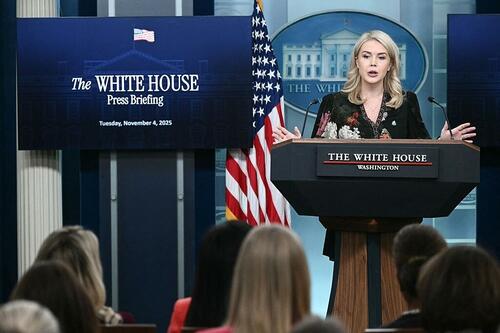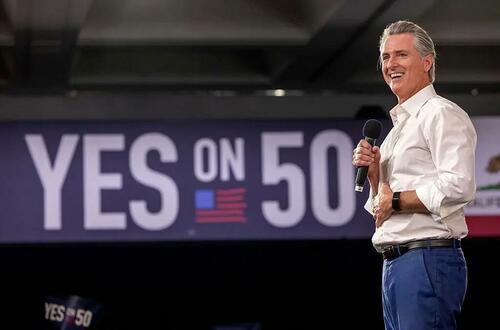Authored by Tom Ozimek via The Epoch Times,
White House press secretary Karoline Leavitt said an executive order is being drafted to strengthen U.S. elections and curb mail-in ballot fraud, after President Donald Trump alleged that California’s mail voting system “is rigged” and parts of it are under “legal and criminal review.”
“The White House is working on an executive order to strengthen our elections in this country and to ensure that there cannot be blatant fraud, as we’ve seen in California with their universal mail-in voting system,” Leavitt told reporters during a Nov. 4 briefing. “It’s absolutely true that ... there is fraud in California’s elections. It’s just a fact.”
Leavitt’s comments followed a Truth Social post by Trump earlier in the day, in which he renewed his criticism of mail-in voting and suggested criminal investigations were underway.
“The Unconstitutional Redistricting Vote in California is a GIANT SCAM in that the entire process, in particular the Voting itself, is RIGGED,” Trump wrote.
“All ‘Mail-In’ Ballots, where the Republicans in that State are ‘Shut Out,’ is under very serious legal and criminal review.”
When asked what evidence the White House had to support those claims and which authorities were conducting the purported reviews, Leavitt said she would provide evidence of fraud to reporters after the briefing, alleging that “fraudulent ballots are being mailed in the names of other people, in the names of illegal aliens who shouldn’t be voting in American elections.”
The White House has not disclosed details of the upcoming executive order. The president has repeatedly promised sweeping changes to election procedures, including a nationwide ban on universal mail-in voting and electronic voting machines.
On Nov. 4, California voters approved Proposition 50, a ballot measure championed by California Gov. Gavin Newsom and state Democrats that allows lawmakers to temporarily bypass the state’s nonpartisan redistricting commission to redraw congressional maps.
Supporters said the measure was a needed counterweight to Republican-led redistricting in states such as Texas, while critics—including Trump—characterized it as an unconstitutional power grab.
Newsom described the referendum as “California’s chance to save democracy,” saying it would help Democrats regain momentum ahead of next year’s elections.
“At the end of the day, it’s about the future of our country,” he told supporters at a Los Angeles rally on Nov. 1.
Republican state Sen. Tony Strickland told The Epoch Times that the measure could ultimately backfire on Democrats.
“If Prop 50 passes, it becomes a rally cry nationally,” he said. “The biggest winner tonight will be [President] Donald Trump.”
California Gov. Gavin Newsom speaks at a "Yes on Prop 50" volunteer event at the LA Convention Center in Los Angeles on Nov. 1, 2025. Jill Connelly/Getty Images
After Trump posted on Truth Social that the redistricting vote was unconstitutional and that some of California’s mail-in ballots are under criminal review, Newsom responded by dismissing the comments as the “ramblings” of someone who “knows he’s about to LOSE.”
Trump has long criticized mail-in voting, calling it a source of widespread fraud. In August, he told reporters that his legal team was drafting an executive order to ban mail-in voting nationwide and to phase out electronic voting machines in favor of paper ballots.
Constitutional experts have said that any such move would face immediate legal challenges. Under the U.S. Constitution, states control the “times, places, and manner” of elections, though Congress retains the power to alter those regulations.
“The president has no power to dictate to states how they conduct national elections,” Rick Pildes, a political science professor at New York University, told The Epoch Times in an earlier interview. He said such changes would likely require congressional approval.
Trump’s forthcoming order would mark the latest in a series of White House efforts to tighten federal election rules.
In March, the president signed an executive order directing agencies to update election security protocols, voter registration processes, and mail-ballot deadlines.
While portions of that order were blocked by a federal judge who found the action exceeded presidential authority, a directive tightening mail-in ballot deadlines was allowed to stand.
Loading recommendations...

